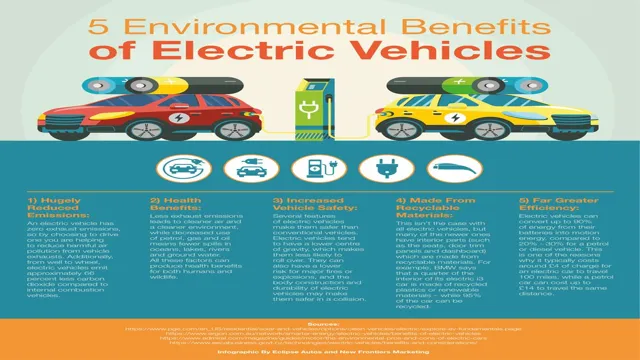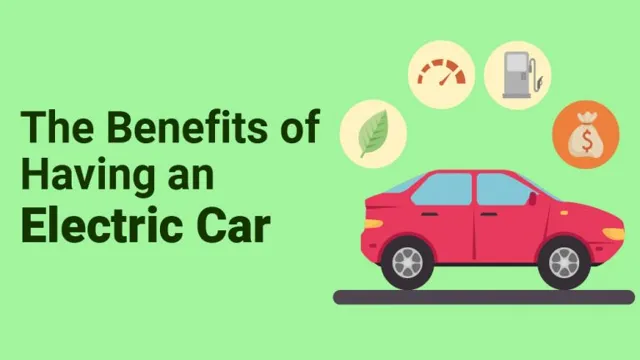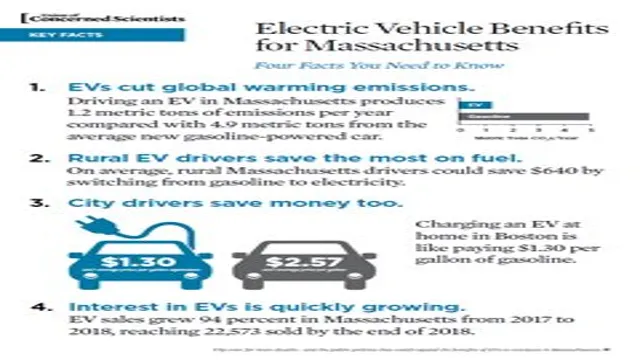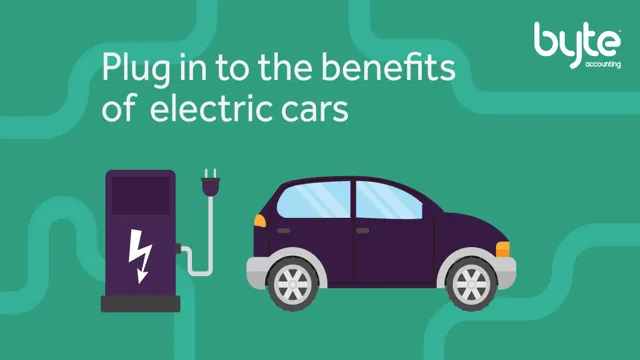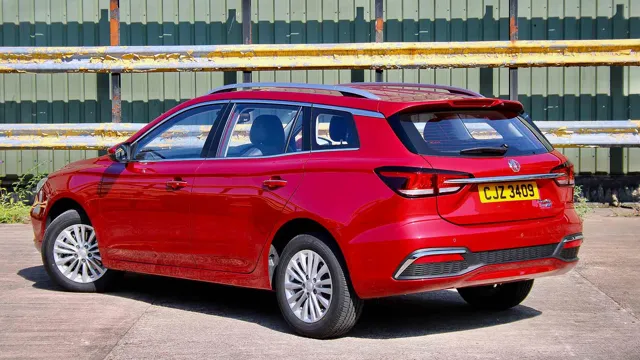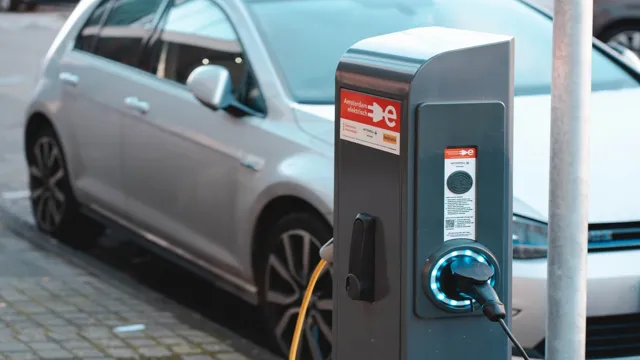10 Ways Electric Cars Are Saving the Planet: Understanding Environmental Benefits
Electric cars have been making waves in the automotive industry in recent years, touted as the eco-friendly and sustainable alternative to conventional gas-powered vehicles. They run on rechargeable batteries, emit significantly lower amounts of greenhouse gases, and require less maintenance than their gas-guzzling counterparts. As the world becomes more conscious of its impact on the environment, many are turning to electric vehicles to reduce their carbon footprint and contribute to a cleaner future.
In this blog, we’ll explore the environmental benefits of electric cars and discuss why they are becoming more and more popular among consumers. So buckle up and get ready to learn how EVs are changing the game and what makes them such a compelling option for the environmentally conscious driver.
Reduced Emissions
When it comes to the environmental benefits of electric cars, the reduction of emissions is a major advantage. The traditional gas-powered vehicle emits harmful gases, including carbon dioxide, which contribute to the ever-growing problem of global warming. Electric cars, on the other hand, produce zero emissions as they run on electricity stored in rechargeable batteries.
Not only do they reduce the amount of pollution in the air, but they also have a positive impact on our health. Studies have shown that air pollution can lead to respiratory problems and other health issues. By driving an electric car, individuals are making a conscious effort to decrease their carbon footprint and contribute to a healthier planet.
It’s a win-win situation!
Electric Cars Emit Zero Emissions During Driving
Electric cars have revolutionized the way we drive by providing a more sustainable mode of transportation. These vehicles run on electricity, which means that they have zero emissions during driving. With the ever-growing concern about climate change and the impact of gas-powered cars on the environment, electric cars offer a solution to reduce emissions and overall carbon footprint.
Unlike gas-powered cars, electric cars don’t produce any pollutants like carbon monoxide, nitrogen oxides, or greenhouse gases while in motion. Driving an electric car is a guilt-free experience as you know that you’re not contributing to air pollution that can harm both the environment and our health. Even the production and disposal of batteries used in electric cars have much lower emissions when compared to the production and disposal of gasoline-powered engines.
By incorporating the latest technology and using renewable energy sources, automakers are striving to further reduce emissions and make electric cars more efficient and convenient for everyday driving. Investing in an electric car is investing in a sustainable future for our planet.
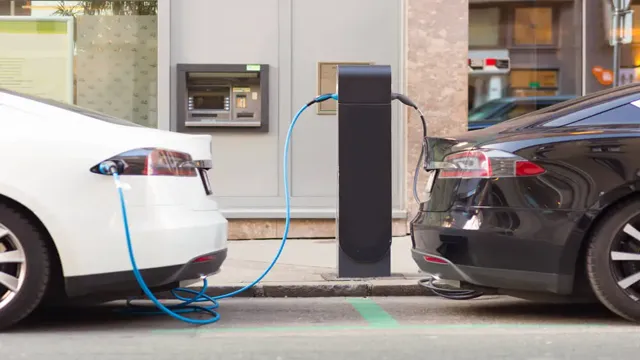
Electricity Generation Is Cleaner Than Fossil Fuel
Electricity generation has long been associated with negative environmental effects due to the reliance on fossil fuels, which emit harmful greenhouse gases. However, the shift towards renewables like solar, wind, and hydropower has given us a cleaner energy future. Unlike fossil fuels, which emit toxic pollutants into the air and are linked to a range of health problems, electricity generated from renewable sources releases little to no emissions.
This means that the air we breathe is cleaner, and the negative impact on the environment is significantly reduced. Moreover, renewable energy sources are sustainable, helping us build a future that is not reliant on finite resources. By transitioning to clean electricity generation, we can work towards a better and healthier world for ourselves and future generations.
Energy Efficiency
As we shift towards more environmentally-friendly practices, electric cars have become a popular alternative to gas-powered vehicles. Not only do electric cars spare us the noxious fumes that come with traditional cars, they also offer significant energy efficiency. This is because electric cars have a significantly higher energy conversion rate than gas-powered cars.
Energy efficiency means that the electric car converts a larger portion of its energy source into usable power, meaning less energy is wasted. This translates to less energy being used overall, which results in reduced carbon and gas emissions. Ultimately, this is an important step towards reducing our carbon footprint and combating climate change.
So if you’re thinking about making the switch to an electric car, know that you’ll not only be doing your wallet a favor in the long run, but also contributing to a healthier, more sustainable planet.
Electric Cars Are More Energy Efficient Than Conventional Cars
Electric cars have drastically improved energy efficiency when compared to their conventional counterparts. This is primarily due to the fact that electric cars use batteries to power their engines, while conventional cars rely on combustion engines to generate power. The power generated by electric cars is 100% efficient, meaning that all the energy that is stored in the battery is used to power the car.
On the other hand, combustion engines are only about 20-30% efficient, as a significant amount of energy is lost in the form of heat and exhaust gases. Additionally, electric motors are much simpler than combustion engines, which means they have fewer mechanical components that need to be maintained, resulting in increased energy efficiency. As electric cars continue to become more popular and advanced, the energy efficiency gap between electric and conventional cars is expected to widen even further.
Electric Cars Can Use Renewable Energy Sources
Electric cars have revolutionized the automobile industry by providing a cleaner and eco-friendly alternative to traditional gasoline-powered vehicles. But, did you know that these electric cars can utilize renewable energy sources, making them even more energy-efficient? Renewable energy is a type of energy that is naturally replenished and can be used repeatedly, such as solar, wind, and hydro energy. By utilizing these renewable energy sources to charge electric cars, we can significantly reduce our carbon footprint and promote a more sustainable future.
Moreover, this will help reduce our dependence on non-renewable energy sources such as oil and gas. So, the next time you charge your electric car, consider using renewable energy sources to power it up and contribute towards a cleaner and greener tomorrow.
Electric Cars Emit Less Waste Heat Than Conventional Cars
Energy Efficiency Electric cars have several advantages over conventional cars, one of which is their energy efficiency. Unlike gasoline-powered vehicles, electric cars generate fewer emissions and require less energy to operate. As a result, electric cars produce less waste heat than their counterparts, making them more efficient.
Waste heat is a byproduct of the internal combustion engine, which converts the energy from fuel into heat that is expelled through the exhaust system. In contrast, electric cars use a battery-powered electric motor, which generates much less heat. This means that electric cars don’t require a complicated cooling system, like conventional cars, which can further improve their efficiency.
Overall, electric cars are a more sustainable and energy-efficient option for drivers looking to reduce their environmental impact and save money on fuel costs.
Sustainability
Electric cars offer concrete environmental benefits compared to traditional gasoline-powered vehicles. One of the most notable of these benefits is in reducing greenhouse gas emissions, which are driving climate change. Electric cars emit no greenhouse gases, pollutants, or harmful chemicals, resulting in reduced air pollution and a cleaner planet.
They also operate silently, which reduces noise pollution, making them the perfect solution for urban areas where noise levels are a concern. Another significant advantage of electric cars is that they reduce our reliance on fossil fuels, which are finite resources that are becoming increasingly scarce and expensive to extract. Charging an electric car from renewable sources like wind and solar power further improves its environmental impact.
Switching to electric cars can create a positive impact on the environment, drive down air pollution, save you money, and make the planet a better place to live.
Electric Cars Contribute to Sustainable Transportation Systems
Electric cars have been gaining popularity in recent years because of their contribution to sustainable transportation systems. By using electric cars, we can reduce our dependence on fossil fuels, thus reducing carbon emissions and helping to combat climate change. Electric cars are also much quieter and emit much less noise pollution than traditional gasoline-powered vehicles.
Plus, they require less maintenance and have significantly lower operating costs, making them more economical in the long run. Overall, electric cars are a key component in building a more sustainable transportation system that benefits not only the environment but also our wallets. So, if you want to do your part in protecting the planet and saving money, consider making the switch to an electric car.
Electric Cars Can Be Disposed of More Sustainably Than Conventional Cars
Electric cars are often touted as the future of transportation, and for good reason. One of their major advantages is the ability to dispose of them more sustainably than conventional cars. Unlike traditional gas-powered engines, electric cars run on rechargeable batteries that can be recycled, reducing the amount of waste sent to landfills.
These batteries are also more environmentally friendly than the lead-acid batteries found in conventional cars. In fact, many of the materials including lithium and cobalt are even recyclable. Additionally, governments and auto manufacturers have set ambitious targets for recycling rates, which will further reduce the environmental impact of electric car disposal.
By choosing to drive an electric car, you’ll not only help the environment during its lifespan but even after it’s no longer in use.
Conclusion
In the end, electric cars are not just a smart choice for saving money on gas or accelerating in style – they’re also an environmentally-conscious decision that can help us all breathe a little easier. By reducing our carbon footprint, improving air quality, and protecting our natural resources, electric cars allow us to enjoy the convenience of modern transportation while also prioritizing the future health of our planet. So, whether you’re a tree-hugger or just seeking a savvy investment, an electric car might just be the perfect fit – because when it comes to the environment, there’s no shortage of benefits to being electrically-charged.
“
FAQs
What are some environmental benefits of electric cars?
Electric cars produce zero emissions, reducing air pollution and improving air quality. They also reduce greenhouse gas emissions that contribute to climate change.
Are electric cars more expensive to maintain than gasoline cars?
Generally, electric cars have lower maintenance costs because they have fewer moving parts than gasoline cars and do not require oil changes. However, battery replacement can be costly.
How far can electric cars travel on a single charge?
The range of electric cars varies, but most can travel between 100-300 miles on a single charge. This can depend on factors such as driving habits, temperature, and terrain.
Are there enough charging stations for electric cars?
The availability of charging stations varies by location, but the number of charging stations is increasing rapidly. In addition, many electric car owners charge their cars at home overnight.
